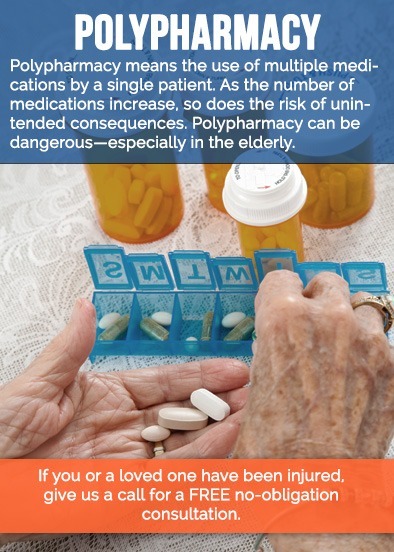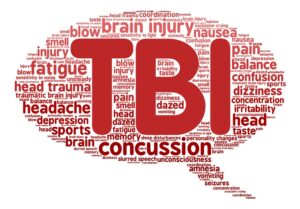 Polypharmacy means the use of multiple medications by a single patient, often defined as four medications or more. In some cases, this many medications are necessary and even medically beneficial.
Polypharmacy means the use of multiple medications by a single patient, often defined as four medications or more. In some cases, this many medications are necessary and even medically beneficial.
But as the number of medications increase, so does the risk of unintended consequences. Polypharmacy can be dangerous—especially in the elderly.
Nursing homes are required to carefully track all medications that a resident uses. Staff must understand the side effects and potential interactions of every drug. If they do not, they may cause serious harm.
If you or a loved one had complications because of polypharmacy in a nursing home, you should speak to a lawyer. John Foy & Associates is one of the largest and most experienced elder care abuse lawyers in Georgia.
Call us at 404-400-4000 and get a free consultation today.
What Counts as Polypharmacy?
There is no strict number of medications that counts as polypharmacy. The rule of “four or more” is not a hard and fast rule and is not a medical definition. Any combination of medications can have unexpected consequences, and care providers need to practice vigilance anytime multiple medications are used.
Get the strong arm
How Common Is Polypharmacy Among Nursing Home Patients?
Polypharmacy has become endemic among the nation’s elderly. While patients of any age face risks from over medication, it is most prevalent in seniors age 65 or higher. This is because seniors tend to suffer more health conditions, and may also be because seniors have less autonomy in choosing their own health care. Many are reliant on caretakers, including nursing homes, to make health decisions for them.
However, not all seniors face an equal risk of polypharmacy. It is much more common in nursing homes. Studies have found that up to 40% of nursing home residents receive at least one potentially inappropriate medication. This is nearly twice the rate of seniors who live in the community.
What Are the Risks of Polypharmacy in a Nursing Home?
Polypharmacy poses serious risks. When two or more drugs are used together, the effects are unpredictable. Pharmacists generally agree that it is impossible to predict the effects of a combination of drugs unless that specific combination has been tested. In other words, Drug A, Drug B and Drug C may have well documented effects, but if you take all of them together, the outcome might be very different and impossible to predict.
This is only the start of the dangers of polypharmacy to seniors. Other risks include:
- Seniors don’t always process drugs the same as younger adults. They may experience changes in metabolism or metabolic slowdown. That makes it harder for the body to eliminate drugs and their byproducts. The more medications a senior uses, the more strain it puts on their body.
- Polypharmacy can lead to the use of inappropriate medications. Technically, polypharmacy is not the same thing as prescribing inappropriate drugs. A person could be on five, six or even ten drugs that are all appropriate for their health needs. But polypharmacy and inappropriate medication often go hand in hand. The more drugs that are prescribed, the more likely it is that one or more are unnecessary.
- Polypharmacy increases the potential for drug interactions. Not all drugs play well together. Many will have different clinical effects, or different side effects when paired with another medication. Sometimes the interactions are well documented and sometimes they are not. But the more drugs being used, the more interactions there could be.
- Seniors are more likely to make a mistake when taking multiple drugs. When an elderly person has numerous medications to keep track of, they may mistake one for another, misread labels or take them at the wrong time of day. This is common among seniors experiencing forgetfulness or dementia.
- Polypharmacy may increase the chances of a dangerous fall. Some studies have found correlations with hip fractures. The explanation is not clear. It could be the effects of unexpected drug interactions, or it could be that polypharmacy just increases the chances of using one or more medicines that cause dizziness.
All of these risks are serious. However, perhaps most serious of all is the danger of a “prescribing cascade.” This is when a combination of drugs causes a new problem—but instead of cutting back, caretakers think it’s a new health condition and prescribe even more drugs.
What Solutions Are Nursing Homes Expected to Use?
All care providers are required to review a patient’s medication regimen on an ongoing basis. This should be a regular, scheduled part of the care plan for every nursing home resident. This review should assess what the care goals are for a patient. Depending on the goals, the progress of a disease, or a patient’s life expectancy, unnecessary medications should be discontinued.
Staff should also have a deep understanding of the side effects and known drug interactions of every medication being used. If a resident experiences a change in condition or mood, their medication should be considered as a possible cause. This protects against the “prescribing cascade” and can also help caregivers discontinue medications that cause problems.
Is a Nursing Home Liable for the Effects of Polypharmacy?
Yes. Nursing homes are expected to exercise caution in prescribing new drugs. They must help patients take their medications on schedule and not mix them up. And they must make sure all staff understand the effects of the drugs they’re using, including prescriptions that came from a hospital or physician outside the facility. They should never mistake the known effects of a drug for another health condition.
If a nursing home fails to live up to these expectations, they are being negligent in the care of your loved one. If this mistake leads to harm, they are liable for that harm. There is no way to reverse what has been done, but they can be held accountable and you can recover the financial costs including treatment, medical bills and additional therapies.
If this has happened to someone you love, you have options. Speak to an experienced elder care lawyer and find out whether you have a case. John Foy & Associates has been helping people who were mistreated by nursing homes for decades. We offer a FREE consultation and we charge nothing unless we get you a financial recovery.
Call 404-400-4000 and get your free consultation today.
(404) 400-4000 or complete a Free Case Evaluation form





